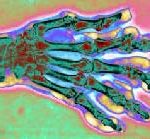Early results in a phase 2 trial are finding that adding a TNF blocker to other treatment could greatly lower the risk of serious complications during pregnancy for women who have antiphospholipid syndrome with lupus anticoagulant.

Subcategories:Axial SpondyloarthritisGout and Crystalline ArthritisGuidelinesMyositisOsteoarthritis and Bone DisordersOther Rheumatic ConditionsPain SyndromesPediatric ConditionsPsoriatic ArthritisRheumatoid ArthritisSjögren’s DiseaseSoft Tissue PainSystemic Lupus ErythematosusSystemic SclerosisVasculitis

Early results in a phase 2 trial are finding that adding a TNF blocker to other treatment could greatly lower the risk of serious complications during pregnancy for women who have antiphospholipid syndrome with lupus anticoagulant.

From pain management to arthroplasty, African American patients with OA and RA experience worse outcomes than white patients. But the reasons for these health disparities are difficult to parse from socioeconomic and cultural factors.

COVID-19 isn’t the only viral infection on the rise across the globe, so is chikungunya, which can cause arthritis-like symptoms and may lead to long-term joint pain.

ACR Convergence 2020—In May 2020, the ACR published its updated guideline for the management of gout.1 It followed on the heels of a 2017 gout guideline published by the American College of Physicians.2 Although the guidelines provide similar recommendations on the treatment of acute gout, they differ importantly in the use of uric acid-lowering therapy…
ACR CONVERGENCE 2020—The definition of cell type depends increasingly on a cell’s molecular features. On Friday, Nov. 6, 2020, Alex Kuo, PhD, senior scientist at Stanford University School of Medicine, Stanford, Calif., described six technologies that are relatively mature and can be used for rheumatic disease research: Rapidly developing single-cell RNA sequencing (scRNA-seq); Cellular indexing…

Certain nutrients or dietary patterns may affect inflammation and rheumatic disease risk in certain populations. Recommended nutrients include omega-3 fatty acids found in fish, poultry or nuts. Following a Mediterranean or standard Western diet may affect RA risk too.

ACR CONVERGENCE 2020—Recent research findings suggest rheumatologists need to take a closer look at two gold standard autoantibodies used to diagnose seropositive rheumatoid arthritis (RA)—rheumatoid factor (RF) and anti-cyclic citrullinated peptide (anti-CCP), according to Caroline Grönwall, PhD, and Miriam Shelef, MD, PhD, who discussed Antibodies in RA: Beyond Citrullination & Back to Rheumatoid Factor at…

Experts say progress is being made on a variety of fronts in lupus nephritis. New data, for instance, shows that repeat biopsy beyond that used for diagnosis can help guide treatment and greatly reduce the flare rate. New treatments – including belimumab and the calcineurin inhibitors tacrolimus and voclosporin — have yielded improved response rates in LN…

ACR CONVERGENCE 2020—New evidence, though derived from small numbers, suggest that treatment with the TNF-inhibitor certolizumab could help improve high-risk pregnancy outcomes in women with antiphospholipid syndrome (with or without systemic lupus erythematosus) and lupus anticoagulants, an expert said. In the Phase 2 IMPACT trial, which has already enrolled 27 women and is continuing to…

ACR CONVERGENCE 2020—Evidence shows that African Americans have a higher burden of osteoarthritis, with lower use of conventional medications, and are less adherent to the medications they take. They also get arthroplasty procedures less often, and when they do have the procedures, they report greater pain, worse function and lower satisfaction with them. In RA…